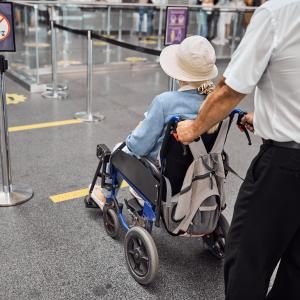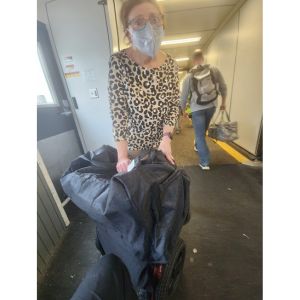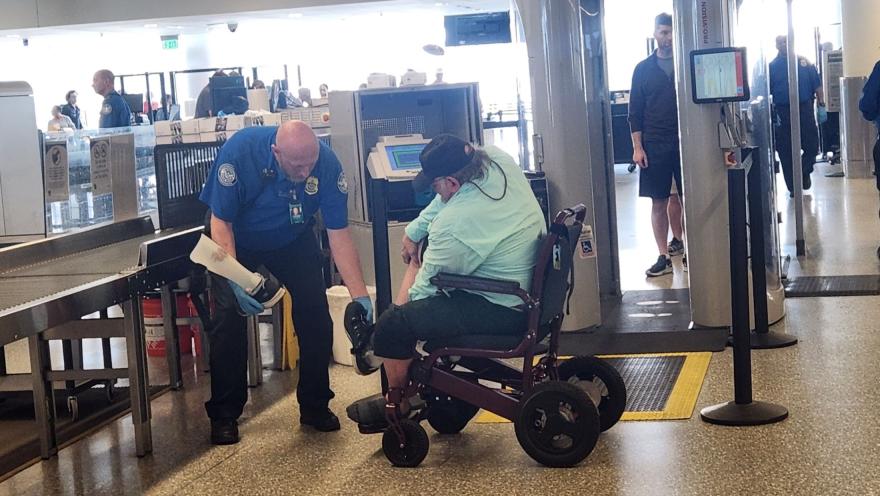Air travel’s singular advantage is that it covers long distances quickly, getting passengers where they need to be in the shortest amount of time possible. Those benefits are pointless, however, when a passenger’s main mode of transport once on the ground—a wheelchair—is rendered useless because of careless mishandling by airline staff.

A proposed new Department of Transportation (DOT) rule aims to address that issue directly. The proposed rule, spearheaded by Transportation Secretary Pete Buttigieg, is a significant move forward in ensuring the safety, dignity, and accessibility of air travel for passengers who rely on wheelchairs, including people living with ALS.
“There are millions of Americans with disabilities who do not travel by plane because of inadequate airline practices and inadequate government regulation, but now we are setting out to change that,” said Secretary Buttigieg.
The core of the new regulation is a commitment to rigorous standards that prioritize the needs of passengers with disabilities. Airlines will be required to provide prompt, safe, and dignified assistance, backed by enhanced training for employees and contractors responsible for assisting passengers with disabilities and handling their wheelchairs.

In addition, specific actions will be outlined to protect passengers if their wheelchair is damaged during transport. This happens far more often than it should. In 2023 alone, more than 11,000 wheelchairs and scooters were mishandled by carriers, emphasizing the urgent need for reform.
Maceo Carter, a person living with ALS, experienced this indignity firsthand. Carter was traveling with his wife, niece, and two-year-old son from Phoenix to Denver for a neurodegenerative conference where he was asked to speak on the mental health aspects of living with a terminal disease.
Initially, he and his family received good service from the airline, including an unexpected upgrade to business class. However, when they got to Denver, Carter’s worst fear was realized: His wheelchair had been damaged during the flight.
That reality for a person living with a disability, especially one with ALS, is devastating.
His experience only got worse from there. Without his specialized wheelchair, Carter had to sit in a regular chair, which left him in a lot of pain. The pain was so intense he was forced to leave the conference, missing the opportunity to speak altogether. Back at the hotel, the airline finally delivered his chair, but it had been shoddily patched together with Scotch tape.
The quick and insufficient “fix” allowed Carter and his family to see some of the sights in Denver, but the experience left him disillusioned with future air travel. “The idea of getting on a plane again, there’s no way in the world I would want to do it because there is no recourse from the airlines for their actions.”
Significantly, the new rule would hold airlines accountable for mishandling wheelchairs, making it an automatic violation of the Air Carrier Access Act. This crucial measure empowers DOT to enforce penalties of up to $100,000 per incident, ensuring that airlines prioritize the proper care and handling of essential mobility equipment.
In considering what airlines could do better, Carter said they could “load these chairs better” and “train people better on how to handle these chairs that are extensions of our bodies.” Both of those improvements are included in the new rule.
With an estimated 5.5 million Americans relying on wheelchairs, the challenges of air travel have long been a barrier to accessibility. Particularly for the ALS community, the fear of broken or mishandled wheelchairs adds an additional, unnecessary layer of stress. Many people with ALS depend on air travel to access vital medical appointments at certified ALS clinics or to participate in clinical trials.
No one should have to endure pain, fear, vulnerability, or missed opportunities when they are simply trying to reach their destination by air.
By easing the burdens of air travel, some of the challenges faced by people living with ALS and their families will be alleviated, ensuring equitable access to necessary health care and treatments.
Every person, regardless of their mobility status, deserves to be treated with dignity and respect. This new rule will mean that all people with disabilities who rely on wheelchairs for mobility—including those living with ALS—can travel safely and confidently for medical, business, or leisure reasons.
Please join our upcoming webinar on April 23, 2024, for a community conversation about issues people with ALS encounter during air travel, what the Federal Government is proposing to make air travel more accessible for all, and how you can influence the Department of Transportation to take action!
Please share your flight nightmares with us HERE by Thursday, May 9, and we will deliver them directly to the DOT on your behalf!
To continue to follow stories about people living with ALS in the community and learn more about the disease, follow our blog HERE.


Join the conversation. Please comment below.